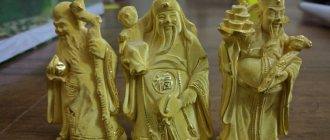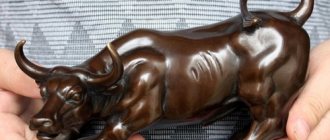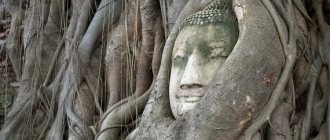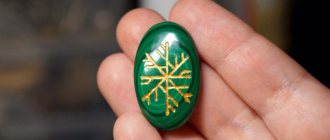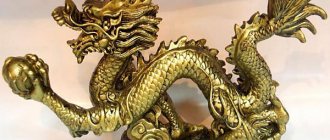The history of the 7 gods
The roots of the formation of this seven gods go back to China, in the 3rd century AD. It is generally accepted that the prototype of the gods in the current perception are the seven sages from the bamboo grove (Zhu-lin-qi-xian) - Yuan Xian, Xiang Xiu, Ji Kang, Yuan Ji, Wang Rong, Shan Tao and Liu Ling.
According to other sources, eight immortals or eight sages were taken as a basis from the mythology of Taoism, who, following the path of Tao, gained immortality and bliss. The path of the seven gods of happiness Shichifukujin has a long history. In Japan, the ancient Buddhist sutra “Ninno hannya kyo” is well known, in which it is written “seven misfortunes will immediately disappear, and seven blessings will immediately appear.”
Under this influence, the idea of the seven gods of happiness was formed. Next, they tried to determine seven types of happiness artificially, by order of the Emperor of Japan. The Buddhist monk Tenkai (Jigen Daishi), known for his philosophical mindset, compared the seven blessings of the sutra with the seven gods and suggested the following types of happiness: longevity, material well-being, contentment, wisdom, fame, honesty and courage.
However, folk art intervened in this process and such laconic formulations regarding the seven types of happiness gradually changed, as did the gods to whom certain benefactors were attributed.
Japanese Shintoism is very loyal to other religions, so it is not surprising that the seven gods of happiness placed in Takarabune's boat (see below) were derived from other beliefs, with the exception of Ebisu, the only one of the seven who is a Japanese god. Of the thousands of gods worshiped in Japan, the place of the seven gods of happiness was taken by one or the other. From the 18th century to the present time, the following gods are considered to be the seven gods of happiness.
Takarabune - Treasure Ship, on which the seven gods of happiness sailed from China to Japan. It is generally accepted that a magic ship is always on its way to another, mysterious and happy world. In Japan, figurines of a magical ship are given as gifts for the New Year with wishes of happiness.
Later, all kinds of amulets and talismans are placed in the boat. Children put it under their pillow on New Year's Eve, and the wishes the child makes come true. Since the 15th century, the seven gods of happiness have been depicted in Takarabune. In Japan, it is customary to give the seven gods of happiness in the first month of the year.
Source: www.domduha.ru
Seven Gods in Japanese Culture
In the 14th century the cult of the seven gods reached its peak. This was especially true in the capital of Japan, Edo, where there was a custom of annual pilgrimage to temples dedicated to one or another god of happiness. This pilgrimage took place in the first month of every year.
And now those who urgently need divine support or who want to escape from the daily whirlwind and, under the shadow of sacred temples, indulge in unhurried thoughts about the eternal, go on a small journey - a pilgrimage to temples associated with the gods of luck.
The temples are located close to each other so that devotees can tour all seven temples in one night. There are several such “ring routes” in Tokyo. The most popular of them runs along the banks of the Sumida River and is approximately three kilometers long. There are signs along the entire path, so it is difficult even for a stranger to lose his way. You can go the whole way alone, but there is also the opportunity to join a group of pilgrims.
In each of the temples, a visitor can put a colorful stamp on a specially purchased card, which thus itself becomes a talisman and a “guarantee” that luck will not abandon its owner.
Pilgrims buy small figurines of the seven gods in the temples - separately or all together on a small treasure ship - Takarabune. After all, it is loaded not only with gold and rice, but also with wisdom, longevity, health, and good luck.
Most often, temple visitors buy the ship depicted in the engraving.
This drawing should be placed under your pillow on New Year's Eve. The Japanese are confident that the first dream in the New Year is prophetic and determines fate for the whole year. It is best if you see Mount Fuji, hawks, or... eggplant.
Noble Mount Fuji, a smart and strong bird, but an eggplant? This came from a statement by Shogun Tokugawa: when he learned about the cost of the first eggplants of the season, he was very surprised and said that only Mount Fuji and Mount Ashitaka (taka - hawk) were more expensive (higher) in his province.
It is also said that Mount Fuji, falconry and the first eggplant of the season were the shogun's favorite things. So a dream about an eggplant is perceived as a clear forecast of a happy year.
Those who are unlucky with their dreams, who dream of something unpleasant, can get rid of the obsession by throwing a leaf with the image of Takarabune into a stream or river in the morning. Then a bad dream - a harbinger of bad luck - will be carried away by the waves far out to sea.
Source: www.livemaster.ru
Bishamon (Tamonten)
Initially, he did not play the role of the god of happiness, he was responsible for war and warriors. That is why he is still depicted with a sword in his hands or a spear and wearing full samurai armor. He was assigned to be one of the four protectors of Buddhist temples.
Origin
Bishamon-ten (bishamon) - Tamon-ten - phonetic calque from Sanskrit of the Hindu god, heavenly messenger Vaishravana, in Buddhism - Tamon-ten (mythologically protects the places where Buddha preaches), - a warrior god.
He fights on the side of good, but since there is still enough evil, he has to fight a lot. Bishamonten lives on the slope of Mount Meru, which is crossed by the axis of the world. He lives on its northern slope and is called the guardian of the North (guardian of the lokapala).
According to more ancient legends, for the first time the figurine of Bishamon-ten mystically came from one wise hermit who lived on Mount Shigi, bringing him a well-deserved reward for his righteousness. Later the war passed into the hands of the valiant Kusunoki Masashige, who named his son Bishamon-ten. Since the 15th century in Japan, it was customary to install the image of Bishamon-ten on the kamidana (stick for the gods) to quickly achieve happiness.
What does it look like
Bishamon-ten, usually in armor and a helmet, holds a sword or spear in one hand, sometimes a trident, and a small pagoda (hoto) in the other. He protects the sacred pagoda and distributes treasures from it to the worthy. Bishamon-ten is often identified with the Shinto god of war Hachiman (Hachiman), whose messenger was once a dove, which is now also Bishamon-ten's bird.
There is one secret. In practice, it is known that there are not many good people in the world and Bishamon can destroy his gifts. He is not only a warrior, but also the patron of the military, lawyers and doctors. They give the figurine to people of relevant professions with wishes of prosperity and happiness.
He was especially revered during the Heian period (794 -1185), when there were wars for the development of Honshu, the largest island in the north of the country. In the old days, this god was often identified with another warrior - Hachiman. In the Tsurugaoka temple complex dedicated to the latter, where the monks prayed for victory in the upcoming battles, doves always sat on the roofs, serving as messengers of the divine will.
Later, these same birds became Bishamonten's messengers. A miniature figurine of a warrior god provides invaluable assistance to its owner, defending justice and attracting victory in the most difficult “battles.”
To whom to give
Bishamon-ten brings justice, good luck and happiness. Patronizes soldiers, doctors and priests. They give a figurine of Bishamonten with wishes of financial prosperity and happiness.
Regular and military deities
To attract wealth, place a figurine of Tsai Shen Ye in the money zone - a powerful and immortal deity who protects from troubles, relieves debts and attracts good luck. According to Feng Shui practitioners, this god of prosperity answers all requests - just make a wish and wait with faith for its fulfillment. She is depicted on a tiger with a whip or a bar of gold in her hands.
Kuan Yu is the martial god of wealth according to Feng Shui. It not only protects human well-being, but also allows him to win victories in competition. He is depicted wearing the cloak of the Nine Dragons. It is better to place his figurine near the door - it will protect the house and its inhabitants from failures and envious people.
We have selected interesting articles for you:
I Ching - Book of Changes
27.01.2019
Feng Shui hieroglyphs
27.01.2019
Bi Gan is an ordinary deity responsible for the proper management of wealth and benefits. It helps to attract new opportunities in life and patronizes new endeavors.
Xi Wang Mu is a goddess who symbolizes all human aspirations, including wealth, fame, prosperity, and long life. By installing her image or figurine at home, you can protect your family from poverty and disagreements. Xi Wang Mu helps improve material life and establish harmony in the home. It is better to install it near the main entrance to the house, then it will also protect the family from troubles and bad people.
Pi Kan is the god of prosperity and prosperity. He is depicted in two forms: as a warrior and an ordinary citizen. It is believed that Pi Kan in the 12th century was a brave warrior and protected the poor.
God Tua Peh Kong is dressed in a robe and holds a gold bar in his left hand. It brings money to the owner, gives power, strength and luck. You can install a figurine with it anywhere in the house, the main thing is that your gifts are near it.
Benten (Benzaiten)
The only female deity among the seven gods is the ruler of the waters, Benzaiten, who protects from disasters and shocks. It promotes the manifestation of talents, teaches eloquence, patronizes dancers, singers and poets, and brings spiritual and physical harmony.
Origin
Benzaiten (Benten) is the only female image among the seven gods of happiness. Goddess of longevity, fertility, water, music, art, eloquence, protects from natural disasters. Now more details.
According to legend, Benzaiten was able to defeat a terrible dragon that devoured children. Having caused an earthquake, she destroyed the cave in which the dragon lived, charmed him and married him, thereby stopping his outrages.
8According to other legends, the dragon turned into a white snake with the head of a monk and became tame, and Bendzaiten became a protector from snakes. But in Japan there is also a common noun for her - when they talk about female beauty as something insidious or useless, a woman is called Benzaiten. In addition to being purely Japanese in origin, like almost all of the seven gods, Benzaiten has another history related to Vedic origins.
The prototype of Benzaiten are three Hindu goddesses: Saraswati, who, being the goddess of wisdom, passed on her ability to speak, Maharshi and Lakshmi.
From pre-Buddhist legends, it is believed that she adopted the gift from the mistress of water, the White Snake. The smoothness and musicality of Bendzaiten's speech is like the flow of water. Her appearance as a goddess owes more to the female form of Bishamonten (Kichijōten), who is considered the incarnation of Benzaiten.
What does it look like
Benzaiten is often depicted playing the biwa, a Japanese mandolin or sacred lute. Therefore, her figurine will be useful to people of art - musicians, artists, writers. She is always ready to give inspiration and help make beautiful fantasies come true.
This deity is often depicted with an uchide no kozushi - a magic mallet. Each of her blows fulfills a wish made by the children. When Daikoku shakes his mallet, coins miraculously fall out of thin air.
Some Japanese believe that if you knock on the ground three times with the symbolic Daikoku mallet and make a wish, it will certainly come true.
To whom to give
In people of creative professions, Benzaiten inspires and imparts abilities in music, literature and painting. As a gift, it protects against natural disasters and promotes longevity and correction of tongue-tiedness.
What God Hotei Can Do
Hotei's main power is to attract wealth. But its capabilities are much wider. The deity can:
- fulfill desires, but only for good purposes;
- increase results from work;
- strengthen intuition;
- open up new opportunities;
- involve in the development of new knowledge;
- develop abilities;
- help with career growth;
- improve mood;
- attract luck and fortune;
- improve family harmony and much more.
REFERENCE. In Eastern culture, figurines of Hotei are placed on the table during the traditional tea ceremony. It is believed that the deity improves the mood and environment, makes conversation pleasant and useful.
Daikoku
Direct patron of wealth and keeper of the hearth.
Origin
Bring the beauty of your soul to perfection, then wealth and luck will flow to you, and you will only have to taste their fruits, - a phrase spoken by Lao Tzu is embroidered on the Daikoku bag and personifies the essence of this god. The prototype of Daikoku came from Buddhism in the form of Mahakala, who was worshiped as the god of wealth and the guardian of faith (guardian and protector of the teachings of the Buddha).
Some associate it with Shiva. But the three-headed and six-armed god Mahakala in this image did not take root in Japan and received a traditional Indian image: in trousers, a hunting suit and a hat with a twisted brim or a peasant hood.
A benevolent fat man with huge ears, a beard or mustache - sheer benevolence and willingness to accept requests. There is a Japanese analogue to Daikoku in Shinto - the deity Okuninushi no Mikoto.
What does it look like
He is depicted sitting or lying on a bag, and sometimes getting out of it, sometimes with two or even three bags, sometimes with a mortar, pounding rice. In his hand, Daikoku usually holds a hammer, a magic mallet (uchide-no-kozushi) or (uchide-no-kozuchi).
After each blow of the hammer, precious stones, coins or rice fall out - whoever needs what. Rats sometimes scurry around inside the big bag, but this is good, because where there are rats, there is prosperity, and through the gnawed holes rice pours directly into people’s hands.
According to another legend, the rat helped Daikoku escape from the angry gods who wanted to punish him for his discourtesy. Since then, the rat, like a faithful friend, always accompanies him. Daikoku is often depicted together with Ebisu.
Despite his mercantile attributes, Daikoku is not greedy or a hoarder. His image speaks of spiritual wealth. There are netsuke Daikoku, on the bag of which lines from Lao Tzu’s treatise are inscribed: “Bring the beauty of your soul to perfection, then wealth and luck will flow to you, and all that remains is to taste their fruits.”
Rats often sit on the Daikoku bag containing the magic rice. From the holes they gnaw, the contents of the bag generously pour into people’s hands. Such a gift will undoubtedly delight businessmen and managers who need wise decisions on which the well-being of themselves and the people around them depends.
To whom to give
Giving a gift to Daikoku means wishing good luck, wealth and prosperity. If you rub your palms in the form of netsuke with this deity, then good luck and happiness will come to you. Daikoku was depicted on one of the first payment papers in Japan.
God Hotei - who is he?
Hotei is one of the seven deities who bring good luck. It not only increases money, but also has broader abilities. He is easy to recognize by his appearance: Although he is bald, plump, and constantly in high spirits. He has a canvas bag in which he hides people's misfortunes or carries wealth and happiness in it.
REFERENCE! People often confuse Buddha with Hotei, which is why they call him the “Laughing Buddha.” He doesn't have a bag, which is what differentiates the two figures.
The character is made in the form of a sitting figure, less often he lies or stands. Additional elements include a fan, children, mythical animals, but there is always a bag.
Hotei
There is no god of happiness more cheerful and cheerful than this carefree fat man with a wide smile. In his hand he has an ordinary bag, from which he is able to endow every person with real wealth.
He is one of the seven gods of happiness with full right, since he can make everyone happy who seeks his protection. It is interesting that this is the only one among the seven gods who had his real life incarnation.
Origin
Hotei is credited with the appearance of a real prototype - the wandering monk Qi Qi, who brought prosperity and good luck with him. Subsequently, the visual image of Hotei was taken from this monk. Although the monk was Chinese, Hotei is of more Japanese origin. The name Hotei in Japan is translated as a canvas bag (Ho Tei), since he always traveled with such a bag. From this bag he distributed to people everything they needed.
To the question - what's in the bag? he answered - the whole world is there.
Later, the contents of his bag came to be considered the Great Emptiness (Ta-Khun), which represents the nothingness from which the great everything was born. After the death of the monk, Hotei began to be considered the eighth incarnation of the Buddha, Maitreya Buddha. In Western culture, Hotei is called the laughing Buddha.
According to the canons of Buddhism itself, Buddha Maitreya is a bodhisattva of the ninth level, who will be born as Buddha Manushi 5000 years after the death of the great Shakyamuni Gautama, whose arrival will be the achievement of world harmony.
Now he lives in the heavenly country of Tushita (Garden of Joy) and, according to Japanese legend, in the form of Hotei he descends to people to please them. Canonized as the god of carefree and happiness in Japan in the 17th century.
https://www.youtube.com/watch?v=fneGP0Bav2Q
What does it look like
Hotei is depicted with a canvas bag, with a staff, sometimes holding a gold bar, a pearl or coins. Sometimes with children. Hotei with a pearl represents wisdom. Okimono Hotei is depicted with magic mushrooms. A sitting Hotei is a female talisman, a standing one is a male talisman. The only mortal god among the seven gods of happiness.
Hotei is traditionally depicted with elongated earlobes and a large belly - the embodiment of the life-giving energy of qi.
In Japan there is a belief: any wish will come true if you stroke a Hotei figurine on the stomach. Such a talisman is designed to relieve financial difficulties and give material well-being. It makes spouses happy, and ensures academic success and harmonious development for children.
Usually it is given to close friends to wish all sorts of blessings, abundance and fulfillment of desires. As a talisman, it is given to young children. Our older generation remembers the little smoker - this is a manju-netsuke, even with a pipe.
The smoke released by Hotei forms a specific hieroglyph (kotobuki), which means a wish for longevity and prosperity. In mythology there is a belief: if you rub Hotei on the stomach 300 times and at the same time think about your desire, then your desire will come true. A figurine of Hotei is always placed in a visible place indoors.
Activation of the talisman
Hotei figurines are very popular for attracting good luck and big earnings to your home. It is better to choose a golden or white figurine: the deity is capricious and has its own preferences. A cheerful god can help lonely people find a family: to do this, you need to buy a figurine in which Hotei is surrounded by children.
Activating the talisman is very simple: you just need to rub the figurine on the belly. In ancient times, the Japanese believed that if you rub Hotei’s tummy three hundred times while thinking about what you want, your wish will definitely come true!
Source: mlady.org
Legends about Hotei
The prototype of Hotei was a real person named Qi-Tsi. He lived in China and was a monk, traveled around the world and always gave people joy. Many claimed that after he left a certain city, the place was transformed and people became rich. After the death of Tsi-Tsi, craftsmen began to make his figurines for good luck. They were often made of stone and wood.
There is another legend about the origin of the god Hotei. Legend says that Maitreya acted as the Laughing Buddha. He was a wonderful man and the ladies always liked him. After a while, he got tired of being handsome and breaking women's hearts. Maitreya reincarnated as a fat and inconspicuous man, and so that the ladies would not grieve, he gave them happiness and wealth.
There is another version about who Hotei is. It is believed that he was an ordinary preacher who began to laugh after achieving enlightenment. He went traveling with a bag on his shoulder, and instead of preaching, he laughed. People were filled with happiness and also began to laugh. Therefore, Hotei became a symbol of fun, joy, prosperity and relief from worries.
Jurojin
Origin
Most of the legends about Jurojin are similar to the origin of Fukurokuju, the appearance and attributes are also the same, with the exception of the shape of an elongated bald head. Jurojin has a normal skull shape and is often covered with a cap. According to his divine purpose, Dryurojin is the god of longevity and respect for old age.
The status of the talisman of the god of happiness came from his ability to give longevity. In this regard, he is usually depicted as an old man with a long white beard. His head is covered with a cap, which is more suitable for a scientist. In his hands he carries a shaku staff, which has a scroll of wisdom attached to the top. According to legend, it records how long each living creature is given to live on earth.
Other beliefs say that the scroll contains the secret of longevity and a happy life. Usually his companions include a turtle, crane or deer. These creatures are known in the east as symbols of longevity. Interestingly, Jurojin is sometimes depicted drinking sake. At the same time, it can be a talisman that protects travelers.
Source: www.domduha.ru
Team assembled
7 gods of happiness in a boat
However, the deities manifest themselves most actively when they are together in their boat. In Japan, there is a term "okimono", literally this word means a thing for putting on display. This is exactly what you should do with this powerful talisman. You need to put it in the most visible and honorable place in the house, watch it, examine it, pay attention in every possible way, wipe it from dust and dirt in a timely manner, and take care of it. This should not just become a habit, but become a mandatory ritual, performed with good intentions and full awareness of what you are doing. In this case, the gods will bestow on you all the best qualities for which they are responsible. Gradually, with proper treatment, they will come to you, improve the quality of life, bring happiness, material wealth, wisdom, longevity, good health, and protect your home and family from bad weather and troubles.
Fukurokujin (Fukurokuju)
God of longevity and wisdom. The name comes from fuku - wealth, roku - career, happiness, ju - longevity. He is depicted as a very old man with an elongated head (phallic symbol).
Origin
Fukurokuju has Chinese history. According to one version, a certain Fukurokuju dissuaded the Emperor of China (Liang dynasty, Emperor Wu, 5th-6th century) from recruiting young men from one of the villages, which earned him the gratitude and veneration of its inhabitants. Since then, his image has acquired the ability to perform miracles and bring prosperity.
According to Chinese traditions, Fukurokuju is the incarnation of the South Pole Star.
It is generally accepted that the prototype of Fukurokuju are the gods of Taoism - Shousin (the Elder of the South Pole, as well as the faithful companions of Shaoxing - Fuxing - the god of happiness and Luxing - the god of career.
This is confirmed by the spelling of the name. In Japan, Fukurokuju is written in three hieroglyphs: fuku - abundance, wealth (Fushin also from Japanese fuku, roku - translated as happiness (Lusin in Japan - rank, career), ju - longevity (Shousin, Lusin and Fushin from Chinese - triad of stellar spirits).
Another legend
He loves to play chess. The following legend is connected with this: one day a farmer, returning home, saw two old men playing chess. The farmer stopped, watching the game, and it seemed to him that after each move the beards of the opponents became longer and longer.
The match was long, and the bearded, long-headed old man treated the peasant to strange-tasting fruits to satisfy his hunger. A long time passed when the farmer finally noticed that the day was over and politely said goodbye to the players.
Rushing home, he discovered that the house no longer existed. The stunned farmer eventually learned that 200 years had passed while he had been watching the chess game.
What does it look like
A benevolent and respectable old man with a long white beard and an incredibly elongated head (the main feature), signifying wisdom, is usually dressed in Chinese clothing, which is often depicted in netsuke as a tortoise shell.
Sometimes Fukurokuju holds a staff, a fan and a scroll in which all the wisdom of the world is written (sutras - sacred texts).
Sometimes depicted with a child or children. Nearby are a shik deer (1500 years old), a long-tailed turtle (minogame) or a tsuru crane. All accompanying Fukurokuju in Japan are also symbols of longevity. Fukurokuju is often depicted in pairs with Jurojin and Daikoku, sometimes with the goddess of happiness Okame.
He is small in stature and has a long gray beard. Can be depicted with a fan in his hands and a scroll containing all the records of the wisdom of the world. Fukurokujin is able to give real longevity and true prosperity. They give a figurine of God to mature people with wishes of prosperity and long life. Also perfect for thinkers, scientists and those who are busy implementing new plans.
Fukurokuju's tall head embodies the exceptional wisdom he has gleaned over the long years of his life. However, she is clearly phallic in shape, which brings to mind Fukurokuju's friendship with the voluptuous goddess Okame.
Who do they give it to?
Usually Fukurokuju is intended as a gift to a person who has reached adulthood, who is wished for prosperity and long-term happiness.
Most often, watchmakers, chess players, scientists, thinkers, as well as everyone who is busy implementing something new, for example, builders of a new house.
Fukurokuju appreciates the art of wise contemplation, although he is not averse to humor and is not offended by good-natured banter. Figures of Jurojin and Fukurokuju are capable of attracting the patronage of the powers that be to the owner, and also serve as a guarantee of good health and longevity.
Ebisu
God of hard work and luck. Patronizes workers of various professions. Usually depicted with a fishing rod in his hands or a tai fish (carp).
It is usually pressed to the side or located behind the back. In a number of variations, the bream ended up under the god's arm, symbolizing his constant companion - luck.
By the way, bream was revered by the Japanese as the main fish among all marine life.
Origin
The first sources of mention of Ebisu belong to the 8th century. Born from Izanagi-no-Mikoro and Izanami-no-Mikoto, the baby had a birth injury - lack of bones, due to the mother’s improper observance of wedding rituals (allegedly, during the first intercourse, the wife was the first to utter joyful words - which was a violation).
To save his life, he was released into the ocean. Later, having matured, he climbed ashore and began to live among people.
Another legend about Ebisu
Ebisu was the son of the gods, the ancestors of the Japanese islands. He was born handicapped, without arms, without legs, and generally without bones. His name was Hiruko no Mikoto (or Hirako), which meant “tadpole.”
At a very early age (legend says that he was not yet three years old), he was carried out to sea on a reed boat (according to another version, his parents themselves let him go, believing that it would be better for him this way).
After long wanderings and overcoming many difficulties, Hiruko did not die, he remained alive, and his boat washed up on the shore of the island of Hokkaido. There he was picked up by an Ebisu fisherman named Ebisu Saburo. He fell in love with the little “tadpole” as his own son, raised and educated him.
At the age of 3, the boy grew arms and legs. Hiruko became a real full-fledged deity with the new name Ebisu.
And he began to help people. Especially fishermen and artisans.
When sailing, Ebisu protects fishermen from bad weather and, with his favor, gives a good catch. Ebisu is considered the god of hard work and helps only those who try to achieve everything through their own efforts. In rural areas, it helps people grow rice and protects them from drought.
What does it look like
Sometimes he is depicted as a master of a certain craft. Ebisu is considered semi-deaf from birth, so he always smiles or laughs.
In the plant world, the symbol of Ebisu is bamboo. Together with Daikoku (according to some sources, Daikoku is Ebisu’s father), Ebisu is considered the patron of trade, crafts, and at home, the keeper of the hearth and an assistant in the kitchen. Sometimes Fukurokujin is added to Daikoku and Ebisu, who is the third god of luck.
In March-April, schools of bream moved to the coast to spawn, where fishermen were eagerly waiting for them, and for this period Ebisu became the undisputed favorite among the “lucky seven”. The twentieth day of each month is considered Ebisu Day in Japan, and from January 9 to 11, Toka Ebisu is held - a holiday in his honor. Having become a popular talisman, Ebisu guarantees his fans good luck in business, self-confidence and inexhaustible optimism.
To whom to give
The figurine is given to fishermen for a favorable catch, small traders, as well as artisans. And in Japan, every 20th day of the month is called Ebisu Day.
It protects the house from fire and burglars. Together with Daikoku, they patronize any crafts and trade, and at home they are the guardians of the hearth and invisible assistants in household chores and in the kitchen.
Sometimes Fukurokujin is added to them and together they form a tandem of good luck.
Source: 1fenshui.ru
Gods of the Slavs
We all want to be happy. And many believe that wealth and prosperity will bring them happiness. And some people simply believe in luck. Let it be as they wish, and let them be rewarded according to their dreams. Let's just see what divine entities help in this matter. The presence of which gods promises both wealth and good luck. What gods exist that help in money matters?
Read about them, look at them. Decide who suits you best. Try to have an image of this God in an accessible place, and from time to time contact your patron. It is said that this is very conducive to achieving wealth.
Patron Gods of Trade and Economics will be very interesting .
SLAVIC GODS OF WEALTH
VELES is the economic god, he was also responsible for domestic animals, it’s not for nothing that he is the “cattle god”, and he was not the last figure in the arable land. The last few unharvested spikelets were called “Veles on the beard.”
MAKOSH - Goddess of fertility, patroness of needlewomen. Some read her name as "Mother of Purses." As the Goddess of Fertility, she is also the Goddess of abundance and prosperity.
SYMBOLISM
ABOVES OF HEAVEN - sometimes this symbol is called the Agidel amulet. And so you can’t immediately tell who the sign is dedicated to: the Gods of Water use it, and the Gods of Air, and there is a place for it in Meteorological Magic. A multi-valued symbol, it develops intuition, attracts happiness and good luck (and therefore the Gods of Wealth and the Diviner Gods also consider it theirs). And also, as a sign of the Goddess Agidel, the sign “Heavenly Abyss” is recommended to all women - to strengthen and increase their beauty and charm (hence, it also turned out to be one of the Goddesses of Beauty).
They say that this sign has a special power: it will protect you from various troubles and worries, it will take away bitterness and failure from you, and it can also protect your thoughts from darkness.
WATCHMAN is a protective sign belonging to God Chur.
The sign is somewhat similar to a person. In this case, a person who guards borders. The sign protects and protects, and, as a result, helps to increase prosperity and wealth. The gods of wealth also welcome this sign.
The sign can be made of any material: burned on birch bark, carved from wood, smelted from metal. This could be an imprint on ceramics or embroidery on a towel.
GODS OF WEALTH IN OTHER PEOPLES.
The most famous of them are the seven gods of happiness - Ebisu, Daikoku, Bishamon, Saraswati, Hotei, Juradzin and Fukurokuzen.
"Team Seven" from Japan, India and China. Figurines of these gods of luck (all together, or each separately, or one of them) can often be seen not only in homes, but in the most unexpected places: in offices, restaurants, shops.
Let's see what these mysterious eastern deities are, who have been bringing goodness and prosperity for more than one millennium.
EBISU - God of honest work and prosperity. Brings success in the profession. It is believed that he comes from Japan, and his teacher and friend is the god of wealth Daikoku.
They say that at birth he was crippled, but then a miracle happened and his arms and legs grew, although he remained slightly deaf.
SACRED ANIMAL (SYMBOL): sea bass (tai fish).
I'm near the statue of the god Ebisu
SYMBOLISM. Ebisu symbolizes honesty in business and justice
APPEARANCE. An ordinary fisherman with a fishing rod, wearing a flattened cap.
FANS: fishermen, farmers, sailors
WORSHIP DAY - 20th of every month.
ACTIVATION (CALLING THE DEITY) - place his figurine near the flowing water and call the god of luck Ebisu
DAIKOKU is the god of wealth, as well as a god who, with the help of a magic hammer, can fulfill any desires of people. God of cuisine and agriculture.
OTHER NAME: Daikokuten or Great Black
PEDIGREE. He comes from India, where his name was Mahakala, and then he came to Japan through China.
APPEARANCE and ATTRIBUTES. He always carries a bag of rice and a hammer with him. True, they say that there is not always rice in the bag. Sometimes there are coins or even precious stones there. And as soon as a rat gnaws a hole in the bag, these pebbles (or coins) begin to fall to the ground. So know: rats are useful creatures, especially if they are accustomed and gnaw through a bag of wealth so that their owner’s wealth increases.
PATRONAGE. This deity used to favor warriors, but then abruptly changed his role and decided that wealth was somehow more reliable
ACTIVATION (CALL OF THE DIVINE) - performance of a special sacred dance of Daikoku
BISYAMON is a warrior god, but at the same time he is the god of prosperity and wealth. God is the protector of temples. He is the guardian of the North, able to exorcise demons. He punishes Evil, and gives good people treasures (or at least wealth). Bishamon is dignity itself.
PEDIGREE. They say that he comes from India. His middle name is Tamonten - this is his name as one of the four heavenly guardians. He is strong and merciful. And in Sanskrit his name means God who hears everything.
APPEARANCE and ATTRIBUTES. Warrior in full samurai armor with a spear and a small model of a pagoda (hoto)
SACRED ANIMAL - dove
FANS: military, doctors, lawyers
BENTEN (SARASWATI) - goddess of wisdom and luck.
OTHER NAME - Benzaiten
HABITAT: water, sea. In India she was considered the deity of rivers
SPHERE OF INFLUENCE: art and thirst for knowledge, wisdom and love, luck. Patronizes artists, musicians, writers.
SPECIAL PATRONAGE: music and water (water shows are exactly the elements where she is rightfully the first)
PROTECTION. They say that the Saraswati figurine can protect from the water element, and from other natural disasters.
SYMBOLIC ANIMAL - sea dragon, snake.
She is said to have sixteen assistants, one for each art form.
KHOTEY is the god of happiness and good nature, compassion and carelessness, cheerfulness and abundance.
The NAME is Japanese HOTEI - canvas bag - and it (the bag) is really present in all images of this god.
APPEARANCE: very fat, cheerful old man
AS A TALISMAN - the Hotei figurine is used to attract wealth and good luck. And they also talk about the number 300. That’s how many times (three hundred!) you need to stroke Khotey’s plump belly, while wishing good things for yourself and those around you, and then happiness will definitely pour out of his bag.
SPHERE OF INFLUENCE: he inspires people to drink deliciously and eat plentifully. Very popular in the restaurant business. They also say that he was a predictor, and all his predictions certainly came true.
JYURODZIN - god of longevity. He is not considered a drunkard, but he drinks a lot of sake.
SPHERE OF INFLUENCE - can give longevity, and this in itself is happiness and good luck.
SYMBOLIC ANIMAL - crane, turtle and deer.
LEGEND. They say that there was a Taoist hermit who sought and found the elixir of immortality. He wrote down the recipe for longevity in his scroll of wisdom, attached it to his staff, and now the god Dzyuradzin walks the earth, and can give many years to those who greet him.
True, skeptics claim that he cannot give anything, but the scroll contains his secret knowledge - who and how long is measured to live on earth.
FUKUROKUJIN - god of wisdom and longevity. He is said to be the Lord of the South Pole Star.
APPEARANCE: short old man with a peculiar head shape (very elongated skull)
SPHERE OF INFLUENCE: works well with thinkers, scientists and those who are busy implementing and implementing new plans. Watchmakers also love it very much. For Fukurokujin is the god of wisdom and precision.
NAME: Fuku-Roku-Ju - can be translated as Wealth-Happiness-Longevity
SYMBOLIC ANIMAL - crane, turtle and bat
HOBBIES: Loves to play chess
In the West, too, there were gods responsible for prosperity.
PLUTOS - God of wealth among the Greeks. They say that it was he who introduced the money. People loved, kept, respected money, and with it, part of the love and respect fell to Plutos. Apparently, Plutos was quite smart: he knew how to attract people’s attention.
PEDIGREE: Mother - Demeter (Goddess of the Earth), Father - Iasion (Deity of Agriculture). They say that Zeus blinded Plutos so that he could not distinguish honest people from dishonest people, but Asclepius was able to restore his sight. Plutos was raised by Tychea and Eirene, the goddess of peace.
ATTENTION! Do not confuse Plutos and Pluto: these are different gods.
IN THE RUSSIAN LANGUAGE PIGGY BOX: rogue and rogue, cheat (in gambling).
TICHEA (Tyuhe, Tiha) - the goddess of fate and luck, the deity of chance.
PEDIGREE: Daughter of Ocean and Tethys
NAME - translated from ancient Greek: what fell by lot is an accident.
IN ANCIENT ROME - Quiet corresponds to FORTUNA (goddess of luck) and FELICIA (FELICITAS) - goddess of happiness
IN THE RUSSIAN LANGUAGE PIGGY BANK - fortune, fart, lucky, wheel of Fortune
SYMBOLISM. The symbol of Fortune is the wheel. Tychea claims that everything is changeable, everything is spinning and can change places. She also has a cornucopia, from which she gifts her fans.
ON THE MAP OF THE STAR SKY: Asteroid (258) Tychea, which was discovered in 1886, is named in honor of the goddess Tyche.
WEREWOLF - TANUKI. In Japanese mythology there is such a werewolf Tanuki. Symbolizes happiness and prosperity. And a very, very big sake lover.
____________
QUESTIONS AND ANSWERS
- What is the name of the God of Fortune? Every nation has its own God. The names of the Gods of luck are in this article. Decide which one suits you personally the most and say his name more often - this will attract the God of luck to you.
****************
Aha
(ancient Egyptian ˁḥ3 - “warrior, fighter”) - the god of wealth and security in ancient Egyptian mythology. Aha was the god of dance and music, as well as the protector of children and mothers.
Inari
- Shinto deity of abundance, rice (and cereals in general), foxes, industry, worldly success, one of the main deities of Shintoism. Inari can be depicted as a man, a woman, or an androgyne, and is sometimes seen as a collective image of three or five individual kami. Inari has been venerated apparently since the founding of the Mount Inari Temple in 711; however, some scholars believe that the cult of the goddess arose at the end of the 5th century AD. e.
Geser
(Geser Khan) - in the mythology of the Mongolian peoples and the peoples of Tibet who were in contact with the Syanbi: a heaven-sent cultural hero -
the Son of Heaven
,
a heavenly horseman
,
the god of war
(patron of warriors) and
the chosen king
(cf. messiah), clearing the earth of monsters - demons - mongooses. As the first person to descend from heaven (more precisely, to hatch from a heavenly “cosmic egg”), Geser goes back to the pre-Buddhist, Bon tradition. In some Mongolian versions, Tsoton turns out to be Geser's double, one of his incarnations.
Kubera
(Sanskrit: कुबेर - perhaps “having an ugly body”) or
Vitteshvara
- the one-eyed god of wealth and the fair-skinned lord (maharaja) of the north (one of the lokapalas), lord of the Yakshas, Kinnaras and Guhyakas, Dharmapala.
Lakshmi
(Sanskrit: लक्ष्मी, lakṣmī
IAST
- “happiness”) - the goddess of blessing, abundance, prosperity, wealth, luck and happiness. She is the embodiment of grace, beauty and charm. They believe that its adherents will be protected from all types of misfortune and poverty. Lakshmi is the eldest consort of Vishnu, married to Rama (in the incarnation of Sita) and Krishna (as Radha and later Rukmini).
Pilvits
,
Pilvitis
,
Pilvitus
(
Pilvytis
,
Pilnytis
,
Pilunitus
,
Pilunytis
,
Piluvytis
,
Pilunytis
,
Piluitus
) - the god of abundance and wealth in Prussian and Sudian mythology.
According to the “Sudavian Little Book” (1563) and “Chronicles of the Prussian Region” by Bretkunas (late 16th century), Pilvits makes him rich and “fills the barns”; identified with the Greek god of wealth Plutos and the ancient Slavic Pereplut. The origin of this name is associated with the Balto-Slavic root pel -
“to be complete, abundant.”
Sabaziy
(ancient Greek Σαβάζιος, Σαβάδιος, Σαβάσιος, Σαβάνδος, Σεβάζιος, Σεβάδιος, possibly also Savvatiy, Sabatius) - the supreme horned god of the tailcoat Indians and Phrygians, according to Strabo, “in some way he is a child” of the Mother of the gods
Februus
(lat.
Februus
) - the Etruscan god of the underworld, where the souls of the dead live, also the giver of wealth, death, and purification. In ancient Roman religion, Februus was the god of purification. The functions of the god of the underworld were performed by Pluto. From the name Februus comes the name of the month of February among the Romans.
You can tune in to the invisible money fluids that fly in the air, but have not yet materialized in your pocket, by sticking your fingers into a socket. In the most literal sense of the word. But the outlet must be treasured. Such an outlet for financial recharging is located at house number 40 on Zosimovskaya Street in the city of Vologda. The number of uses is unlimited.
—————
Article from the PANTHEON OF SLAVIC GODS, spirits and heroes
(1840) Information selected specifically for the site
Location and activation of talismans
- Can be placed in the southeast, in the Wealth zone
- In the east, in the Family zone
- At the entrance door in the hallway
- In the office
Image of Daikoku and Ebisu
If the figures are used separately, then Daikoku can be placed anywhere, and they even say that to activate it, you just need to admire it more often. And it is advisable to place Ebisu near water (for example, near an aquarium or indoor fountain).
The Daikoku and Ebisu talisman is the patron of businessmen, merchants, traders, patronizes any endeavor related to the accumulation of wealth, good for protecting the home and for wishing good luck to children.
As you can see, its range of actions is quite wide. Therefore, you can purchase it both for yourself and as a gift for friends and family.
Sometimes a third hero is added to the pair Daikoku and Ebisu. This could be either Shou-shin (god of health and longevity) or Fukurokuju (god of wisdom).
Such “complex talismans” are considered extremely favorable.
Source: vash-fenshyu.ru
How to activate the amulet
Any talisman requires proper activation. After all, this way he will feel like a full member of the family and actively support well-being, health and good luck in the house. In the case of the Hotei figurine, activation occurs along the Bagua grid - you need to choose the right place. But this should be done cheerfully, with enthusiasm, using a creative approach to this process.
It is necessary to forget all grievances, tune in to the positive, be polite and respectful to each other. It is advisable that all family members participate in the process of activating the talisman. A joint interesting business will contribute to Hotei’s confident continued stay in the house. If there is misunderstanding and bad atmosphere in the family, then it is better to postpone the activation to another time.
